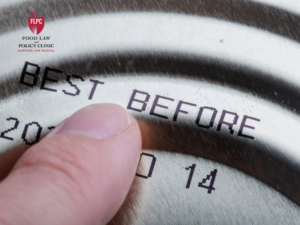This blog post was written by Sophie DeBode, a student in the Food Law and Policy Clinic.
Last week, a new ordinance was introduced in Boston, the Ordinance Formally Creating the Office of Food Justice and Establishing a Food Recovery Program in the City of Boston. Introduced by Councilors Ricardo Arroyo and Gabriela Coletta, the ordinance addresses the issue of food waste and encourages food donation. The Massachusetts Department of Environmental Protection (MassDEP) estimates that over 1 million tons of food go to waste in Massachusetts each yearand that 25% of solid waste after recycling is food waste. At the same time that this food is wasted, rates of food insecurity in Massachusetts doubled during the pandemic, hitting a peak of almost 20%.
In order to reduce this food waste, MassDEP instituted a Commercial Organic Waste Disposal Ban in October 2014, and strengthened the ban under new rules that took effect in 2022. Under the ban, non-residential “food waste generators” producing over one-half ton of organic waste per week are prohibited from incinerating or disposing of this waste in landfills. While the state’s organic waste disposal ban is a ground-breaking policy which significantly reduces organic waste going to landfills, the state law does not mandate that edible food be put to its highest use—human consumption.
The proposed Ordinance promotes food recovery and addresses food waste by formally enshrining the Office of Food Justice, an office which is in place but was only created by the Mayor. The ordinance directs the Office to improve accessibility and affordability of healthy food in Boston and to create a Food Recovery Program that requires certain food businesses to donate all edible food.
Implementing this Ordinance and establishing a food donation requirement would make Boston the first city in the country to implement such a novel policy. The ordinance establishes a food donation requirement by mandating three primary stakeholders act in the following ways. First, covered commercial edible food generators (which will be divided into two tiers, based on business type and size, and phased into compliance over a two-year period, requiring compliance from more sophisticated entities first) must donate excess edible food fit for human consumption to food recovery organizations. Second, food recovery organizations must report to the City of Boston on the amount of food collected. Third, the City of Boston, through the Office of Food Justice, must administer the program via education, outreach, guidance, reporting, and enforcement.
Food donation requirements are a growing tool to combat food waste and food insecurity internationally and at the state level. Though this policy is still novel, several states, including California, New York, and Washington, have begun implementing food donation requirements and goals alongside organic waste bans. In California, SB 1383, effective as of January 2022, set a goal to rescue 20% of currently disposed surplus food for people to eat by 2025. CalRecycle is implementing the goal via regulation by requiring food businesses to donate all excess edible food. While SB 1383 is a statewide law, local jurisdictions partially implement the law by educating generators about the requirements, facilitating connections between generators and food recovery organizations, monitoring generators’ compliance with the requirement, and imposing penalties for noncompliance.
While food donations requirements have shown success at the state level, they have yet to be introduced or enacted at the local level, though several localities have implemented organic waste disposal bans. By introducing such legislation and implementing a donation requirement, the City of Boston would be on the forefront of efforts to combat the environmental and economic harms of food waste while simultaneously reducing rates of food insecurity.
The Harvard Food Law and Policy Clinic wholeheartedly welcomes the introduction of this Ordinance and supports the City of Boston in its efforts to reduce food waste and improve food access and sustainability.

Health Law & Policy, Commentary
Cuts to the Federal Workforce and Medicaid: What’s Happening and What Can Advocates Do? – Health Care in Motion
March 12, 2025